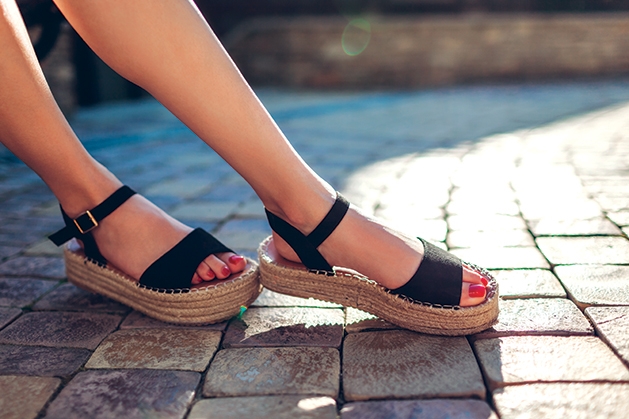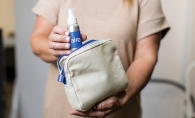
‘Tis the season for sandals, flip flops and barefoot walks along the shore—and paying closer attention to our feet. After a long winter bundled up, you may feel tempted to treat your feet to a spa pedicure, or, perhaps you’ve already taken a pumice stone to them at home. Aside from beautification, now is also a good time to check the overall health of your feet.
Michael Ebertz, MD, a founding partner of Skin Care Doctors in Orono, says that feet are arguably one of the most overlooked parts of the body, as well as one of the most important. For healthy summer feet, a few key steps include proper footwear along with foot care.
“Wear shoes that allow good air and blood circulation,” Dr. Ebertz says. “Occlusion hurts your feet [and] can cause corns, calluses, blisters and foot sores.” While sandals and flip flops may not be supportive enough for most summertime sports, they can be helpful in preventing infections from community pools or locker rooms. “People commonly can acquire viral warts, fungus or other bacterial infections when their bare feet are directly exposed to these surfaces,” Dr. Ebertz says.
As far as foot care is concerned, that pumice stone or pedicure may be useful in preventing painful skin cracking due to dry patches. Even foot massages have medical benefits, with Dr. Ebertz pointing out that they help to stimulate blood flow and can relieve tension of foot muscles and joints.
While you’re giving your feet the royal treatment, make sure you’re also checking for any unusual pigmentation or new moles. “Having moles on your feet is pretty rare,” Dr. Ebertz says. “If you have one that’s been there your whole life, it’s not changing, it’s most likely okay. But if you get a new mole or a change to an existing mole, you need to get in to be seen right away.”
New moles or changes to an existing mole are a potential indicator of a sun-induced skin cancer, such as melanoma. “If you have any evidence of changing or new moles on your feet, reach out to a dermatologist to have them evaluated,” Dr. Ebertz says. This also means that the next time you’re visiting your dermatologist for a check-up, the socks should come off, too.
Two types of carcinoma skin cancers also found on the foot, basal cell and squamous cell, are caused by long-term sun exposure and present with unusual skin pigmentation. But regardless which of these three cancers you may develop, the treatment is the same. “Skin cancers have to be excised or removed with a scalpel. It’s a surgical procedure,” Dr. Ebertz says.
Prevention is easier than treatment, which is why it’s so important to wear proper sunscreen protection when you’re wearing sandals, and why it’s a good idea to limit the about of time your feet spend soaking up the sun.
Just What the Doctor Ordered
The following are Dr. Ebertz’s recommendations for sunscreen to protect your feet along with the rest of you:
- EltaMD SPF 46
- EltaMD SPF 50 spray
- La Roche-Posay SPF 50
- Neutrogena Sheer Zinc SPF 50
Keep in mind, there’s no such thing as waterproof sunscreen, Dr. Ebertz says. If you’re coming out of the water, don’t forget to reapply.








